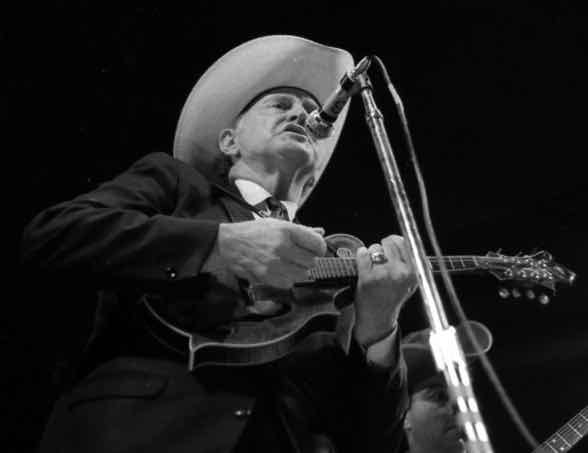
BILL MONROE
William Smith Monroe was born to father J. B. “Buck” and mother Malissa Vandiver on September 13, 1911, on a farm in Jerusalem Ridge, just outside Rosine, Kentucky. His mother played accordion, fiddle, and harmonica, while his siblings played guitar and fiddle. After his father died when Bill was 16, he moved in with his uncle Pendleton Vandiver (later immortalized in the classic song “Uncle Pen”), who taught Bill to play guitar, mandolin, and fiddle. Perhaps because no one else in the family played it, Bill concentrated on mastering the mandolin.
By 1927, Bill joined with his brothers Charlie, who played guitar, and Birch, who played fiddle, to play on broadcasts. They eventually joined with National Barn Dance as dancers. By 1930, the Monroe brothers had found success with “Kentucky Waltz,” which peaked at #3, “Footprints in the Snow,” which hit #5, and “Blue Grass Ramble.” That same year, they secured positions on the radio in Indiana. In 1936, Bill and brother Charlie toured Iowa, Nebraska, North Carolina, and South Carolina; they also found time to cut sixty sides for RCA’s Bluebird label.
Unfortunately, the brothers possessed different musical dreams and visions, and the two parted musical ways in 1938. Bill formed his original band, the Kentuckians, before settling on another name: The Blue Grass Boys.
The year after the brothers split, Bill and his Blue Grass Boys joined the Grand Ole Opry, riding on their phenomenal success on the radio show with “The New Muleskinner Blues,” a new version of Jimmie Rodgers’s classic. During the 1940’s, Bill played the Opry on the weekends and on weekdays ran a traveling tent show which included Uncle Dave Macon and DeFord Bailey. By 1946, Bill had founded a legendary band that included Lester Flatt on guitar, Earl Scruggs on banjo, and Chubby Wise on fiddle. Bill had formed a new genre of music: bluegrass.
Lester and Earl left the Blue Grass Boys in 1948 to concentrate on their own Foggy Mountain Boys. Nonetheless, through the years, Bill’s band included many other great instrumentalists including Mac Wiseman, Jimmy Martin, Stringbean, Sonny Osborne, and Vassar Clements. In the meantime, Bill moved to the legendary Decca label. He had hits with “Blue Moon of Kentucky,” “Uncle Pen,” “What Would You Give In Exchange For Your Soul,” and “I’ll Meet You in Church Sunday Morning,” among many others. All the while, Bill never compromised his sound for commercial profit. He created the Bean Blossom Festival, which opened in Indiana in 1967. During his concerts, he began permitting concertgoers to bring their instruments for an informal “jam” session.
In 1970, Bill was inducted into the the Country Music Hall of Fame. Shortly after, he was inducted into the Nashville Songwriters Association International Hall of Fame (1971). In 1984, he opened the Bluegrass Hall of Fame and Museum in Nashville, Tennessee. In the years before his death, he was inducted into the Bluegrass Hall of Honor and received a Grammy Lifetime Achievement Award and the National Medal of the Arts. “Blue Moon of Kentucky” was even named the official state bluegrass song of Kentucky.
Bill Monroe died from a stroke on September 9, 1996, in Springfield, Tennessee, just four days shy of what would have been his 85th birthday. Nonetheless, the Father of Bluegrass lives on. Recently, Ricky Skaggs and other various artists released a tribute album dedicated to him entitled Big Mon. Marty Stuart, himself a protege of Flatt and Scruggs, dedicated several songs to the legendary singer, including one from his critically acclaimed album, The Pilgrim. Clearly, Bill Monroe is a legend whose place
in bluegrass music will never be forgotten.